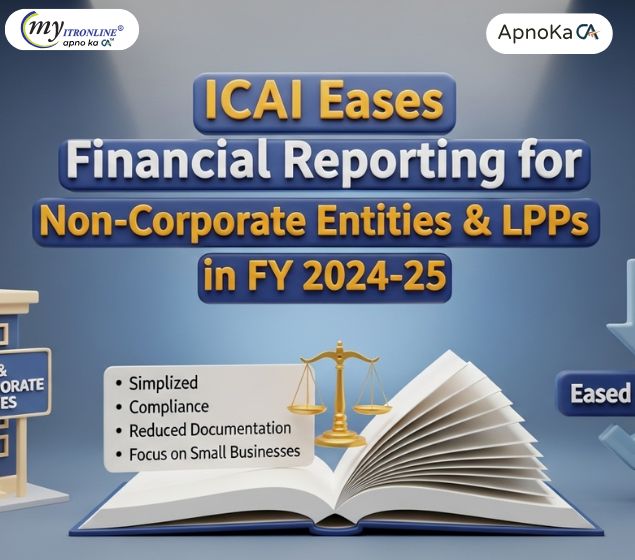# regulations
12 posts in `regulations` tag

ICAI Eases Financial Reporting for Non-Corporate Entities & LLPs in FY 2024-25
The Institute of Chartered Accountants of India (ICAI) has announced a significant, temporary compliance relaxation for non-corporate entities and Limited Liability Partnerships (LLPs) for the Financial Year 2024-25. This allows these entities to optionally adopt updated guidance notes on financial statements, aiming to reduce administrative burden while maintaining transparency and accuracy. This flexibility ensures that core accounting standards remain paramount, offering businesses a choice in their reporting approach for the upcoming fiscal year.

New Cheque Bounce Laws 2025: Key Changes & Penalties Explained
In 2025, India will witness major changes in cheque bounce regulations aiming to enhance financial accountability. From increased penalties and real-time alerts to special courts and relief for technical errors, these rules target both prevention and faster resolution. This guide covers everything individuals and businesses need to know to stay compliant and avoid legal complications.

The deadline for linking PAN and Aadhaar is now extended to December 31st, 2025
The deadline for linking PAN and Aadhaar has been extended by the Indian government to December 31, 2025, for applications that are filed prior to October 1, 2024. Not adhering to this requirement could lead to the PAN becoming inactive and affect financial transactions.
.jpg)
New TDS Rules 2025: Changes in Tax Deduction Limits for FD Interest, Dividends & Rental
This article discusses the impending modifications to TDS regulations that will take effect in April 2025, particularly highlighting the raised thresholds for FD interest, dividends, and rental income. Discover how these changes can advantage taxpayers and what steps to take in anticipation of the new rule.
.jpg)
CBDT’s New Form 49C Rules: Stricter Tax Compliance for Non-Residents in India
Stricter guidelines have been implemented by the Central Board of Direct Taxes (CBDT) for foreign nationals submitting Form 49C in India. Enhancing openness and guaranteeing adherence to tax regulations are the goals of these modifications. Important changes include more stringent penalties for non-compliance, obligatory digital filing, and expanded disclosure requirements. In order to prevent fines and operating delays, non-resident businesses are now required to keep proper records and follow more stringent filing deadlines.
.jpg)
RBI’s New Guidelines for NBFCs: Key Changes and Impacts
To improve financial stability and reduce systemic risks, the Reserve Bank of India (RBI) has issued new regulatory rules for non-banking financial firms (NBFCs). The categorization of NBFCs, the scale-based regulatory approach, governance enhancements, and the sector's operational ramifications are all covered in detail in this blog.
.jpg)
Who Must Deduct TDS Under Section 194J and Its Implication
The deduction of TDS on payments for technical and professional services, royalties, non-compete agreements, and directors' compensation is governed by Section 194J of the Income Tax Act. This blog discusses the dates, thresholds, appropriate rates, and who must deduct TDS. Penalties, interest, and the disallowance of expenses may follow noncompliance. To guarantee compliance and prevent fines, be informed.
.jpg)
RBI Guidelines 2025: Ensuring Compliance to Avoid Account Closures
The RBI's new standards require non-compliant bank accounts to be closed as of January 1, 2025. To prevent interruptions, account holders must maintain account activity, update their KYC information, and reply to compliance notices. Financial interruptions, limited banking services, and permanent account closure are possible outcomes of non-compliance. These steps are intended to improve financial system security, lower fraud, and increase transparency.
.jpg)
Tax-Exempt Status and Section 12AB: Must-Know Rules for Charitable Trusts
Significant modifications were made to charitable trust registrations under Section 12AB of the Finance Act 2020, which replaced Sections 12A and 12AA. The validity, due dates, and compliance requirements for trusts under Section 12AB are highlighted in this blog. Additionally, it describes the repercussions of non-compliance and provides practical advice on how trusts might successfully preserve their tax-exempt status.
.png)
Understanding the New RCM Rules for Rental of Immovable Property
This blog post explains the recent changes to the Reverse Charge Mechanism (RCM) for property rentals in India. Landlords of commercial properties are now responsible for paying GST on behalf of unregistered tenants. The changes take effect on October 10, 2024. Businesses must update their accounting systems and seek professional advice to ensure compliance.
.png)
Key insights into how new income tax regulations can impact shareholders
For shareholders, the proposed increase in the corporate tax rate from 21% to 28% might have significant ramifications. Reduced capital gains, dividends, and corporate earnings might put stockholders at risk of higher taxes and slower market expansion. Higher taxes, though, may also lessen income disparity and boost public coffers. This blog examines the possible advantages and disadvantages of the new income tax laws for shareholders and offers advice on adjusting to these adjustments.
.png)
PPF Rules: Significant Modifications Take Effect October 1, 2024
The Public Provident Fund (PPF) regulations have undergone substantial modifications for investors with the implementation of the 2024 revisions on October 1st. A greater deposit cap, more freedom for early withdrawals, online nomination, longer loan terms, and quarterly interest rate adjustments are a few of them. PPF account holders now have more flexibility, investment possibilities, and convenience thanks to these changes.
